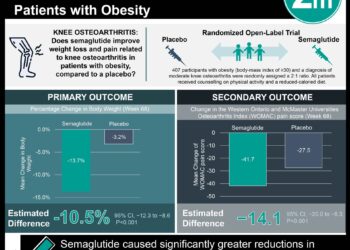Risk factors for diabetes in people with HIV
1. This follow-up analysis of the phase 3 REPRIEVE trial demonstrated that region of residence, prediabetes, high BMI, and metabolic syndrome were risk factors for new-onset diabetes in people with HIV.
2. While pitavastatin use was also associated with a higher risk of diabetes, there was negligible interaction with the other risk factors except among the few patients with a combination of obesity, prediabetes, and multiple metabolic syndrome components.
Evidence Rating Level: 1
Study Rundown: People with HIV (PWH) may be at unique risk of developing diabetes mellitus (DM) due to factors like antiretroviral therapy and changes in body composition. While statin use has been linked to DM in the wider population, no large prospective trials have examined this effect specifically among PWH. Using data from the previous REPRIEVE global trial, which found that pitavastatin use led to a reduction in major adverse cardiovascular events, this study aimed to examine risk factors for DM in PWH, including factors related to pitavastatin use. In both participants who received pitavastatin and participants who received a placebo, the presence of three or more risk factors – which included region of residence, prediabetes, high BMI, or aspects of metabolic syndrome – had an almost 10-fold increase in DM incidence rate as compared with no risk factors; prediabetes alone was associated with approximately a 6-fold increase in diabetes incidence in both groups. The pitavastatin group was found to have had a higher diabetes incidence rate overall as compared with placebo, and while some differential effect was observed by race and region, this was not statistically significant. The generalizability of this study was limited by the fact that pitavastatin was the only statin examined, and that new DM diagnoses were confirmed only by use of antidiabetic medication and not by HbA1c levels. Nevertheless, this study proposed several risk factors for developing DM in both statin- and placebo-treated PWH.
Click to read the study in AIM
Relevant Reading: Pitavastatin to Prevent Cardiovascular Disease in HIV Infection
In-Depth [randomized controlled trial]: This study utilized findings from the phase 3 REPRIEVE trial, which investigated the effects of pitavastatin on MACE prevention in PWH. REPRIEVE participants were age 40-75, had known HIV infection being treated with stable ART, and scored low-to-moderate for ASCVD risk. A total of 7731 participants were ultimately analyzed for this study over a median follow-up of 5.6 years. Overall, 414 participants had new-onset diabetes during the trial, 232 of whom were in the pitavastatin group (incidence rate per 100 person-years [IR], 1.18) and 182 of whom were in the placebo group (IR, 0.91). Clinically significant risk factors for new-onset diabetes were origin from South Asia (IR 2.43 for pitavastatin and 2.12 for placebo), prediabetes (IR 3.91 for pitavastatin and 2.97 for placebo), BMI ≥ 30 kg/m2 (IR 2.56 for pitavastatin and 1.93 for placebo), and metabolic syndrome (IR 2.77 for pitavastatin and 2.28 for placebo). Participants with three or more risk factors for DM also had a higher incidence rate than those with zero risk factors in both the pivastatin group (IR, 3.24) and the placebo group (IR, 2.66). Further modeling involving combinations of DM risk factors showed increased IRs for participants from South Asia and Black or African American participants from high-income regions, suggesting a greater prevalence of risk factors among these populations. In summary, this study identified multiple risk factors for new-onset DM in PWH.
Image: PD
©2024 2 Minute Medicine, Inc. All rights reserved. No works may be reproduced without expressed written consent from 2 Minute Medicine, Inc. Inquire about licensing here. No article should be construed as medical advice and is not intended as such by the authors or by 2 Minute Medicine, Inc.





